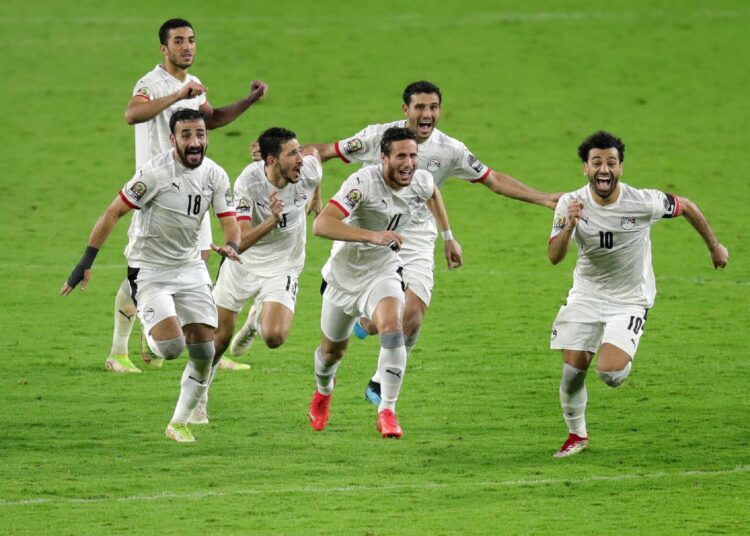YAOUNDE, Cameroon – Liverpool teammates Mohamed Salah and Sadio Mane – two of African football’s leading forwards – will be facing off as rivals for the continental title.
Egypt is through to the final of the 2021 Africa Cup of Nations after beating hosts Cameroon 3-1 on penalties at the end of a goalless 120 minutes in Yaounde.
Goalkeeper Mohamed Abou Gabal was the hero for the Egyptians, saving from both Harold Moukoudi and James Lea-Siliki in the shoot-out at the Olembe Stadium before Clinton Njie blazed wide with Cameroon’s last chance to keep their dream alive.
Mohamed Salah, usually the fifth penalty-taker for his country, was not needed as Egypt advance to a final showdown against Senegal at the Olembe Stadium on Sunday.
That will see Salah come up against his Liverpool teammate Sadio Mane, with the Pharaohs chasing a record-extending eighth African crown while Senegal continue their search for their first title.
Cameroon, meanwhile, see their hopes of AFCON glory on home soil ended in cruel fashion, and they must still get through a third-place play-off against Burkina Faso this weekend.
Just 10 days had passed since the disaster at the stadium, when eight people were killed and 38 injured prior to Cameroon’s last-16 win against the Comoros.
The Confederation of African Football had temporarily shut the venue pending an investigation into the events, stripping it of a quarter-final before giving it the green light to reopen here.
Olembe is a spectacular stadium from the outside and from within, but there was still an uneasy feeling at normal service resuming so soon after the disaster.
Many fans were clearly put off, with just 24,371 fans attending in the 60,000-seat venue — many more could have been present even with Covid restrictions limiting crowds to 80 percent of capacity for Cameroon games.
The lack of fans was a shame in what is a football-mad country, and Cameroon and Egypt are the two most successful sides in Cup of Nations history — the Indomitable Lions’ tally of five titles is bettered only by the Pharaohs.
“It was a good match for us. A difficult match against a good Cameroonian team but our team knew how to make the difference with a Mohamed Salah who supported us throughout the match like a great leader,” Egypt’s defender Mohamed Abdelmoneim said.
“Thank God, we succeeded in our penalty shootout to secure a place in the final,” Abdelmoneim added.
“Each time, the Egyptian team is favourites to win the tournament. Tonight we played the usual game and we managed to reach the final,” Egypt’s Assistant Coach Diaa el-Sayed said.
“I would like to thank our coach Carlos Queiroz who was expelled during the game as well as all the players who made the difference with their ardor and grinta throughout the tournament.
“We are happy, it’s true, but we have not yet reached the final objective: the coronation. I can also add that our background is also due to the presence of one of the great players in our training, namely Mohamed Salah. A very essential player in our team and who remains the centerpiece for us,” el-Sayed added.
“The team played well during the 90′ trying to score goals but we didn’t succeed. We are as sad as the 27 million Cameroonians, but I think the Egyptian team knew how to counter us,” Cameroon’s coach Antonio Conceicao said.
“We are sad but it’s the reality. The players felt some signs of fatigue at the end of the match, especially after a very physical and intense first half. We had tried to save our energy to counter the opponent but in vain,” Conceicao added.
Queiroz sees red card
The Egyptians had a score to settle as they sought revenge for their 2-1 defeat at the hands of the Indomitable Lions in the 2017 final, when Vincent Aboubakar came off the bench to score the winner in Libreville.
An impact substitute then, Aboubakar is now the Cameroon captain and the top scorer at this tournament with six goals.
So confident was he coming into this game that he dismissed the threat of Salah in a radio interview, and the Egyptian captain was peripheral in this game, too often an isolated figure on the right wing.
He did, however, pass up a glorious chance to open the scoring early in the second half when a dreadfully short back-pass by Martin Hongla sent him clear.
After trying to knock the ball round Andre Onana, the Cameroon goalkeeper successfully stopped him just outside the box.
Aboubakar also struggled to make an impact, although the hosts had dominated the first half and almost went ahead in the 18th minute when Michael Ngadeu rose to head a corner off the woodwork.
Samuel Oum Gouet also saw a long-range piledriver clip the left upright in the second half.
Meanwhile the Egyptians went down at every opportunity, regularly looking to eat up time and frustrate their opponents.
Usually they eventually stood up again unscathed, although centre-back Mahmoud Hamdy el-Wensh needed a bandage on a first-half head wound.
At least they ended the game with 11 players, but coach Queiroz — whose assistant was serving a ban here — was shown a red card as the end of normal time loomed after losing his temper on the touchline.
This was Egypt’s third extra time in as many knockout ties, after they needed penalties to beat Côte d’Ivoire in the last 16 and an extra half-hour to get the better of Morocco in the quarter-finals.
Extra time passed with penalties always seeming inevitable, and Aboubakar was the only successful taker for Cameroon as they go out.






Discussion about this post